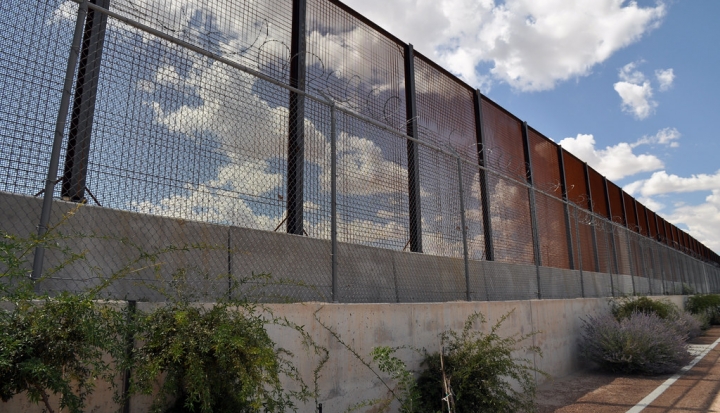Ranchera music bounced out of the novelty and discount clothing stores as the 25-year-old Jesuit in formation made his way through downtown El Paso, Texas to Annunciation House, a shelter for migrants and refugees. Aromas of menudo, tamales, chorizo, and huevos frying in the pan wafted through alleyways. Storefronts and billboards advertised in Spanish as often as in English. Not far away, an 18-foot metal fence stretched for miles between the border, with familiar white and green Border Patrol vehicles stationed intermittently on both sides.
Jesuit Conan Rainwater couldn’t have felt further removed from his home base of urban Chicago, where he was pursuing a master’s degree at Loyola University Chicago. He had wanted to improve his Spanish and learn more about immigration over the summer. Applying to serve at the Jesuit-run Sacred Heart Church, located just blocks from the U.S.-Mexico border, had seemed like a good idea.
But it was June 2018. The country was deep into the migrant family separation crisis. Unknowingly, Rainwater, who would soon be joined by Jesuits Matthew Baugh and Matthew Cortese, had placed himself smack in the middle of it. Over the next several weeks, the three Jesuits in formation would discover the raw, human dimension of immigration, along with the amazing response of this border community—what Rainwater called a “little sliver of the kingdom of God made real.”
Remarkable encounters
Perched on an angular downtown block, Annunciation House, a 41-year-old Catholic-based house of hospitality, has operated entirely on donations and volunteers since its inception. It is under the direction of cofounder and executive director Ruben Garcia and a committed board of directors. There is no sign outside its door. Yet, like hundreds of thousands before him, Rainwater found his way to the deteriorating brick building in the city’s poorest section, known as the Segundo Barrio. Inside, children rolled toy trucks and cars along the floor of the sala while their parents lounged on sofas chatting and watching TV, awaiting news from their sponsors. In his first encounters with immigrant families, Rainwater began to hear remarkable stories of hardship, emotional pain, and uncertainty.
“The amount of trust and faith these people have is something I’ve never seen before,” Rainwater says. “They have no idea what’s going to happen, and they have to abandon everything and trust in God and in others that somehow this journey will work out. It made my trust and faith in God so much deeper. I witnessed what these people go through and their remarkable perseverance and resilience. They have way more trust and faith in God than I do.”
Over the years Garcia has established a relationship with Immigration and Customs Enforcement (ICE). The agency generally communicates with Garcia once it is ready to release processed asylum seekers. After placing GPS ankle monitors on the adults, ICE delivers the families to Annunciation House or somewhere else in its network of temporary shelters scattered throughout the city and as far as Las Cruces, New Mexico. Volunteers then assist the families with the next leg of their journey by offering food, clothing, a hot shower, and a bed. Volunteers also call the families’ sponsors, who must purchase costly, last-minute bus or plane tickets to get families to their destination, where they must check in with ICE and await their asylum hearings.
One of Rainwater’s responsibilities was to walk the families to the nearby bus station, help them buy their tickets, and explain the many transfers to their final destination. Some were headed on a three-day trip, supplied simply with a bag of donated food, a change of clothes, and no money. As Rainwater walked to the Greyhound station one evening, he felt uneasy dropping off a mother and child who would spend the night there before catching an extremely early morning bus.
“The first time I did this, the mom’s name was Maria, and I felt like I was accompanying Mary,” he says. “I wondered how I could just leave them there. I wanted to go back the next morning and check on them to make sure they got on the bus. But then I realized I did my part and the real power directing them is the Holy Spirit. I have to trust that they’ll be taken care of.”
A week later Baugh arrived from Boston College to volunteer at Annunciation House.
His first task was to accompany a single mother and her daughter to the bus station. Along the way, the woman explained how as a Guatemalan business owner she constantly experienced extortion. When she couldn’t pay, gang members threatened to return and take her young daughter. The two fled before the gang could fulfill that threat.
Baugh barely had time to process this when, later that afternoon, ICE delivered a man who had been released from the hospital. During his journey north, the man’s shoes had fallen apart, and he had walked barefoot in the desert, literally burning the skin off his feet.
“That was day one at Annunciation House!” Baugh exclaims. “You get lost in people’s stories straight away.”
Ironically, Baugh, now in his 12th year of Jesuit formation, had been attracted to El Paso because of his familiarity with Annunciation House and his experiences as a novice living in Guatemala. But he did not anticipate that he would soon witness the trauma to which Central Americans are exposed on this side of the border.
Preparing a place called Nazareth
By late June 2018 the Trump administration’s policy of family separation at the border had ended and a judge ordered that parents and children be reunited. Annunciation House was one of only four nongovernmental organizations in the country designated to receive the reunified families. Since the dilapidated building could not accommodate the expected several hundred families, Garcia looked to a temporary shelter.
Loretto Nazareth, as the center is fondly known, seemed like the best option.
The hospitality site, an unused wing of the Nazareth Living Care Center nursing home, first opened in response to the influx of families in the summer of 2014. With its two long hallways of cot-filled rooms, three showers, and a kitchen and dining area, the wing was ideal for family units. It operated for 2.5 years as a temporary respite for asylum seekers until early 2017, when the number of people arriving drastically decreased and the Sisters of Loretto sold the building.
When the need for the shelter resurfaced, Loretto Sister Mary “Buffy” Boesen contacted the new owners to ask if they would be willing to reopen the west wing.
“They knew when they purchased the building what we had been using that part of the building for,” Sister Buffy says. Within hours, the owners called back saying they would allow it.
Reopening the site meant finding and organizing volunteers to staff it 24/7; reconnecting with church groups and others willing to prepare and serve meals to feed the guests; restocking supplies of toiletries, bedding and towels, clothing, diapers, medicines, and tote bags and snacks for traveling; and reestablishing a list of volunteers willing to drive families to the bus station or airport.
Garcia approached Rainwater and Baugh to oversee this enormous task.
The symbolism of preparing to reopen a place called Nazareth didn’t escape the young Jesuits, who as part of their formation reflect daily on the presence of God in their lives. The Ignatian Spiritual Exercises involve meditating on scripture scenes. For Baugh, meditating on the nativity and “on what the Holy Family had to endure just so that Jesus could be born” turned into a powerful practice.
“St. Ignatius wanted our contemplation to infuse our action and vice versa,” Baugh explains. That happened when his meditation and real-life experiences began to blend.
“It struck me how we were concretely preparing the place for these families, just like preparing a place for the baby Jesus,” Baugh says. “It’s very different when you have this concrete person in front of you, especially when they have a baby or a little child. I think that’s what St. Ignatius really wanted—for us to experience this.”
“Incredible hospitality”
With Rainwater at the helm as designated director, Nazareth started receiving families immediately upon reopening. Handling the details of operation meant ensuring rooms were clean and ready for the next family, checking room assignments, orienting new volunteers, and even unblocking toilets.
“There are so many moving parts and pieces,” Rainwater explains. “Some volunteers have full-time jobs, families, their car breaks down, whatever. Yet the fact that it all works out is a sign that the real power directing this is the Holy Spirit.”
Once Annunciation House gained national attention for receiving reunified families, a stream of volunteers began arriving—and not only residents of El Paso. People hopped on planes in California, North Carolina, and Pennsylvania. Others, like one woman from Denver, got in their cars and drove. Former Annunciation House volunteers, now settled in lives elsewhere, came with spouses and children or left behind jobs to answer a call put out through social media.
By the time Cortese arrived on summer break from his teaching position at Le Moyne College in Syracuse, New York, Nazareth was buzzing.
Cortese felt like he was in an “alternate universe” as reporters and photographers from NPR, the Washington Post, and elsewhere swarmed their door. “I felt like the Spirit was really moving and leading me, in that I could never have planned or foreseen being there in the midst of this humanitarian issue,” he says.
In addition to the media attention, Cortese was becoming acquainted with another phenomenon—“the incredible hospitality of this community.”
Many of the Diocese of El Paso’s Catholic parishes, along with other Christian churches, a Jewish synagogue, the Borderland Rainbow Center, an El Paso Girl Scout troop, and impromptu groups with names like “the Angry Moms” and “the Usual Suspects,” united to support the families.
Some arrived to prepare and serve meals. Others donated tote bags stuffed with supplies. Some dragged tubs overflowing with sheets and towels to the laundromat. Working side by side, these strangers performed whatever service was needed.
Every day. No complaints.
“The diversity of volunteers was beautiful to see,” says Rainwater. “It was everyone realizing that there’s something bigger going on in here. It’s not volunteering to get that box checked. It’s more, ‘I’m here because this is how I live out my faith, this is what you do to treat others with dignity.’ I’ve never seen that happen to this degree. This is society and community at its best.”
“It’s Catholicism at its best,” adds Cortese.
Newcomers to El Paso had similar reactions. Kenny Welch, the chief executive officer of the Nazareth Living Care Center, arrived in late July. He popped into the shelter periodically to see what was going on. “Immigration is nothing like what you see on TV,” he says. Cortese was impressed by volunteers handling incessant needs and telephone calls. “Every day I’m amazed at the volunteers willing to help. It restores my faith in humanity.”
“They looked like zombies”
For the next few weeks the Jesuits worked 9- to 13-hour days to ensure the center operated smoothly and every family got where they needed to go.
Some days they’d forget to eat, but no one was bothered.
“I felt liberated by performing these corporal works of mercy. Even by cleaning toilets,” says Cortese. “St. Ignatius called it low and humble service.”
Despite the demands, the men had opportunities to interact with the guests. When the reunified families arrived, that’s when they began noticing differences in the children who had been separated.
“Every family that arrives at Nazareth has experienced some kind of trauma,” Baugh says. Leaving their home country and everything they’ve known for a journey thousands of miles along unfamiliar terrain with no guarantees of food or assistance along the way can be frightening. As a result, sometimes the children initially seem shy or hesitant. The welcome and kindness from volunteers quickly changes that.
“In the family reunification process, we noticed the separated kids, particularly 11- to 13-year-olds, were more traumatized,” Baugh says.
When he tried to talk or joke with them, one of two things happened: “Either I got a blank stare and they didn’t respond, or the kid would start crying uncontrollably. That was a big difference from what we had seen in the children who hadn’t experienced family separation,” he says.
Rainwater experienced the same reactions. “I realized right away something was up with those kids, especially the preteens,” he says. “They looked like zombies. It was almost like they were looking straight through you. It was scary to see that.”
In the evenings at the Jesuit house the three men would trade stories, pray, journal—and laugh. “It was so intense, laughter would help,” explains Cortese. He worried about any lasting effects on the children for what he said “could only be described as some of the worst trauma they’ve experienced.”
Joy for the long term
“What particularly struck the three of us was that we were there for only a few weeks, but the people of El Paso have been doing this for, in some cases, 40 years,” says Baugh, who has since been ordained into the diaconate.
Whatever need arises, the community simply steps up to meet it.
“A number of long-term volunteers are just unflappable. ICE delivers another 60 people out of nowhere, and they take on whatever with a certain tranquility,” says Baugh. “That fidelity impressed me. My experience is that people generally have fervor and energy up front for a mission project, but when you’re going to be doing this for decades, there will be times when you don’t feel like doing it.”
Baugh’s impression was supported last Christmas Eve when, in an unusual move, ICE dropped off more than 200 immigrants on the street in downtown El Paso unannounced. Volunteers sprang into action, leaving family and Christmas preparations to bring blankets, food, and coats to hungry, cold, penniless strangers.
Garcia, who has long experienced El Paso’s generosity, was not surprised. “It exemplifies El Paso’s multicultural reality. We are an immigrant community, and this is how immigrants take care of each other,” he says.
Every day Garcia designates how many families each center will receive, according to the numbers ICE tells him it is releasing. During the latter part of 2018, the increase in family units arriving at the ports of entry expanded Annunciation House’s number of temporary shelters to as many as 18 operating on different weekdays. Each requires numerous volunteers and donations, but for the few that operate 24/7, like Nazareth, the need is great.
“It’s a tribute to the people of El Paso that they continue to make these hospitality centers work,” says Sister Buffy. “People are incredible—and not just in El Paso, but all over the country.” Over Christmas she received large monetary gifts for Annunciation House collected from Loretto Academy alumnae, some living as far away from the border as Kentucky. Women religious have also made enormous donations through the Leadership Conference of Women Religious, as have innumerable individuals and organizations.
That assistance is vital. And not unusual. Many have echoed Baugh’s description of how this ministry “feels like the loaves and fishes story, sort of miraculous.” Whatever is needed appears as it’s needed, including untiring volunteers.
“El Paso is definitely the place where the renewal of the church is happening,” Baugh says. “Sometimes you get this feeling that people are uneasy about where the church is headed, but in El Paso what I see is a lot of joy for the long term. At Nazareth, everyone was joyful.”
This article also appears in the July 2019 issue of U.S. Catholic (Vol. 84, No. 7, pages 12–16).
Image: Flickr cc via Jonathan McIntosh














Add comment